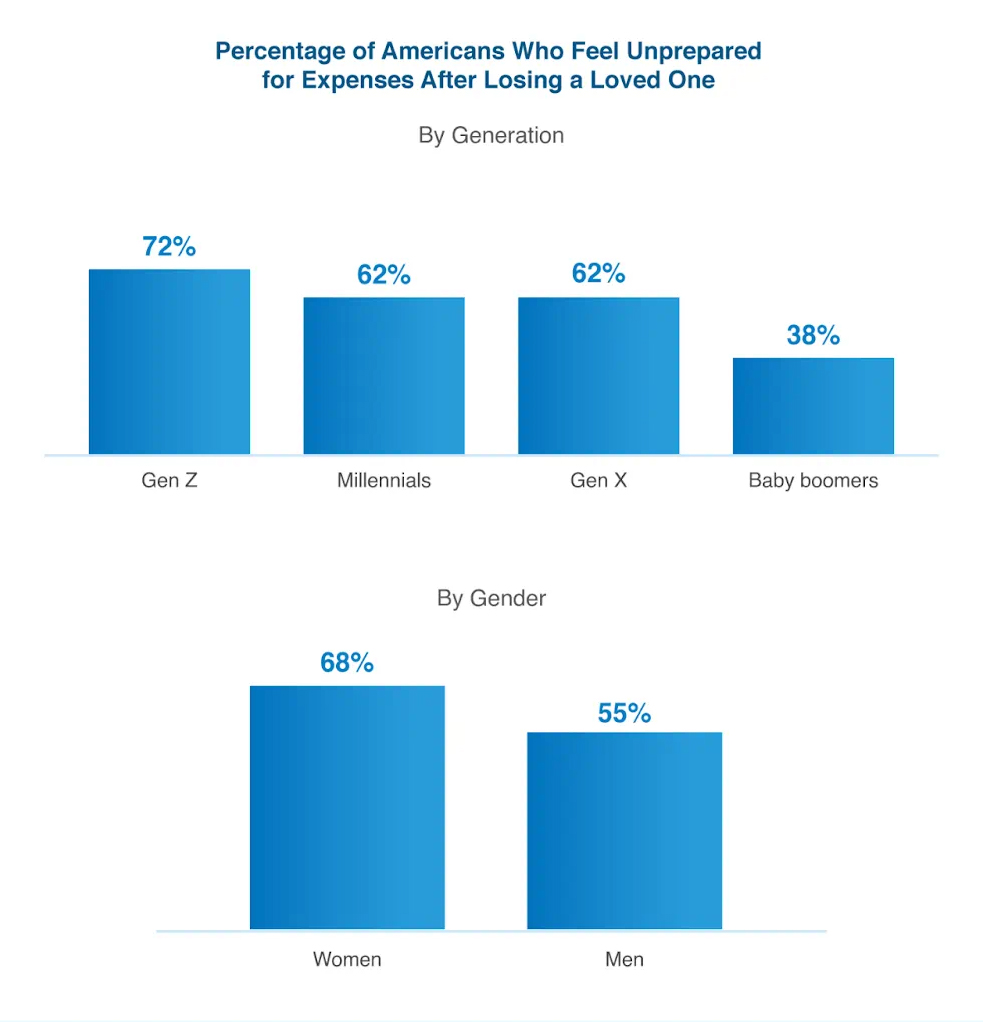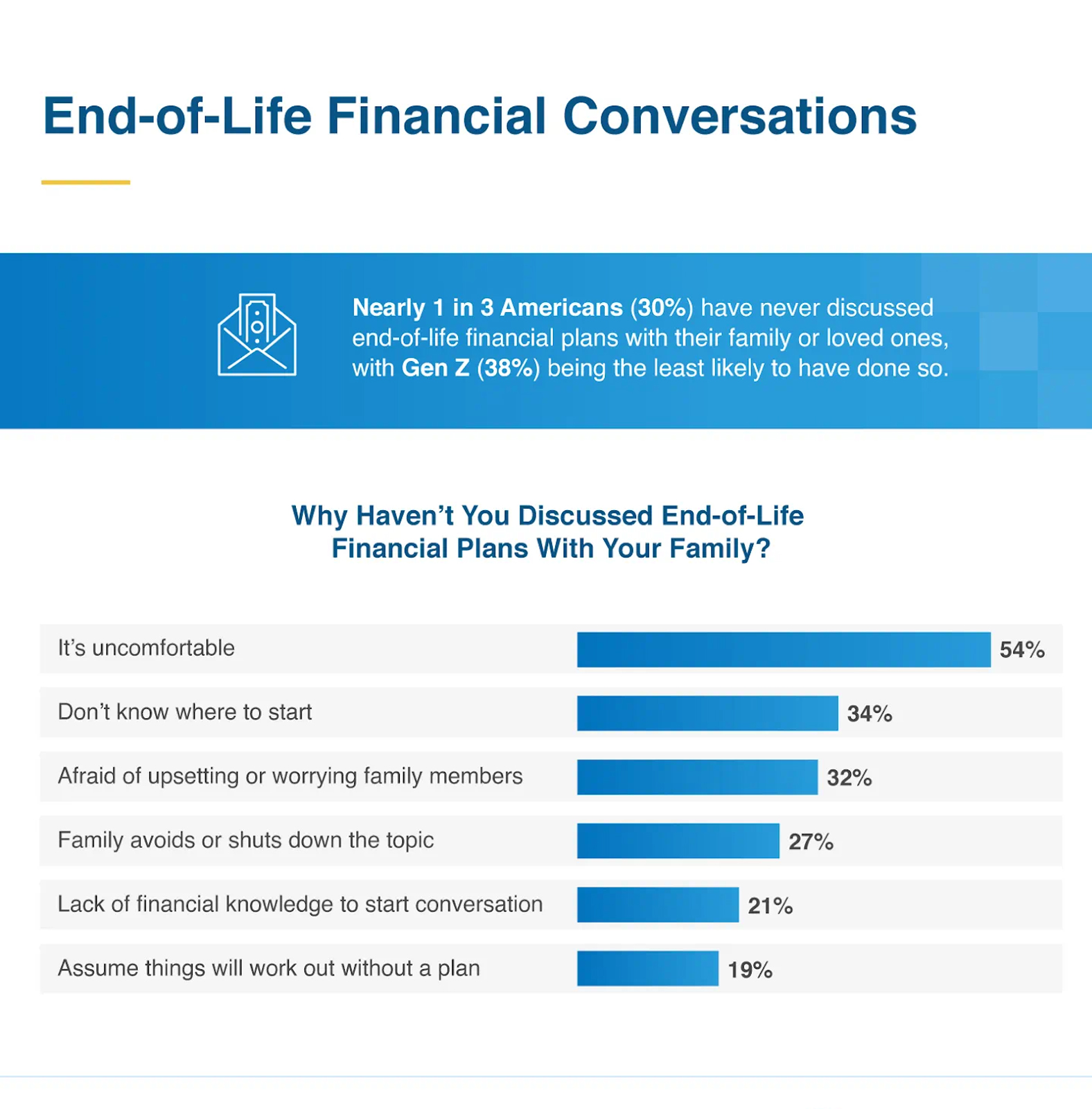Over Half of Americans Stumble Financially After Losing a Loved One. Are You Prepared?
Losing a loved one can be overwhelming, and for many, it also puts an unexpected strain on their finances, a study shows.


Profit and prosper with the best of Kiplinger's advice on investing, taxes, retirement, personal finance and much more. Delivered daily. Enter your email in the box and click Sign Me Up.
You are now subscribed
Your newsletter sign-up was successful
Want to add more newsletters?

Delivered daily
Kiplinger Today
Profit and prosper with the best of Kiplinger's advice on investing, taxes, retirement, personal finance and much more delivered daily. Smart money moves start here.

Sent five days a week
Kiplinger A Step Ahead
Get practical help to make better financial decisions in your everyday life, from spending to savings on top deals.

Delivered daily
Kiplinger Closing Bell
Get today's biggest financial and investing headlines delivered to your inbox every day the U.S. stock market is open.

Sent twice a week
Kiplinger Adviser Intel
Financial pros across the country share best practices and fresh tactics to preserve and grow your wealth.

Delivered weekly
Kiplinger Tax Tips
Trim your federal and state tax bills with practical tax-planning and tax-cutting strategies.

Sent twice a week
Kiplinger Retirement Tips
Your twice-a-week guide to planning and enjoying a financially secure and richly rewarding retirement

Sent bimonthly.
Kiplinger Adviser Angle
Insights for advisers, wealth managers and other financial professionals.

Sent twice a week
Kiplinger Investing Weekly
Your twice-a-week roundup of promising stocks, funds, companies and industries you should consider, ones you should avoid, and why.

Sent weekly for six weeks
Kiplinger Invest for Retirement
Your step-by-step six-part series on how to invest for retirement, from devising a successful strategy to exactly which investments to choose.
Losing a loved one can take a deep emotional and mental toll. Yet, beyond the grief, many are unprepared for the financial strain that follows — from paying for funeral expenses to everyday living costs. The financial fallout can be overwhelming.
A study by the Western and Southern Financial Group shows how prepared (or unprepared) Americans feel about the financial challenges that can come from the loss of a loved one.
- Over half of Americans (51%) experienced financial struggles after losing a loved one.
- 62% of Americans don't feel financially prepared to handle expenses that may arise if they lose a loved one, with Gen Z (72%) being the most likely to say so.
- 39% turned to credit cards or personal loans to cover unexpected expenses after the loss of a loved one. Gen Z (47%) was the most likely to do so.
62% of participants felt ill-equipped to handle the costs that often come after the loss of a loved one, the survey showed. Women (68%) expressed more financial concern than men (55%), highlighting a gender gap in perceived readiness. While over half of the participants said they have struggled financially after losing a family member, 14% described their challenges as significant, while 37% said they were manageable.
From just $107.88 $24.99 for Kiplinger Personal Finance
Become a smarter, better informed investor. Subscribe from just $107.88 $24.99, plus get up to 4 Special Issues

Sign up for Kiplinger’s Free Newsletters
Profit and prosper with the best of expert advice on investing, taxes, retirement, personal finance and more - straight to your e-mail.
Profit and prosper with the best of expert advice - straight to your e-mail.
The death of a spouse can also result in a considerable decline in average income for the surviving spouse, which is particularly difficult for baby boomers (60%) compared to Gen X (51%), millennials (33%), and Gen Z (39%), per the survey. Affording immediate living expenses posed a challenge, especially for Gen Z (41%) and millennials (34%). Many (26%) also feared falling behind on mortgage or rent payments.

To cover many of the unexpected costs after losing a loved one, many of those surveyed relied on savings or emergency funds, with Gen Z leading at 57%. Credit cards or personal loans were used by 39%, and Gen Z (47%) was again the most likely to rely on this method. Less than half, or 35%, used life insurance payouts and 7% turned to crowdfunding platforms, with the highest participation among Gen Z (11%).
Average cost of a funeral
It's not surprising that many people are caught off-guard when it comes to the financial costs of losing a loved one.
The average cost of a funeral can range from about $6,300 to $8,300, depending on whether it includes burial or cremation services. The median cost for a traditional funeral with viewing and burial is around $8,000, according to the National Funeral Directors Association.
Other costs to consider may include a burial plot, flowers, memorial service, headstone and markers, and the obituary in the newspaper or online. There are also legal matters, including lawyer fees and costs associated with selling off assets and real estate or other property, paying off outdistancing loans or bills, not to mention lost wages.
A few financial steps to follow after the loss of a loved one
If you haven't yet faced the loss of a loved one and the financial challenges that often follow, here are a few steps you can take to help reduce confusion and stress when the time comes.
- Gather all financial documents. This may include estate planning documents, such as a will or trust, tax returns, utility bills, rent or mortgage payments, bank statements, etc.
- Inform agencies providing benefits. The Social Security Administration, Veterans Affairs, and Medicare are only a few of the agencies that will need to be notified. You’ll also want to contact their insurance company if they had a life insurance policy.
- Contact their bank or other financial institution. You’ll likely need a death certificate to access the financial information of your loved one. Also, if there is a transfer-on-death (TOD) order, their assets will be transferred to the designated beneficiary.
- File the will in probate court. After you file the will, the executor of the will can begin distributing the deceased’s assets per their instructions.
- Settle all remaining debt. In many cases, any remaining liabilities, like a mortgage or auto loan, will be payable by the person who inherits them. Credit card balances, student loans, medical loans, and more are typically charged against the deceased's estate.
- Prepare a final tax return. The final tax return should be submitted by the next tax filing deadline. Work with a tax consultant or attorney to ensure the process goes smoothly.

Financial planning for life after loss
When you lose a loved one, it’s not uncommon to rely on savings, retirement accounts, Social Security, and any life insurance previously purchased to meet your unexpected financial commitments. However, the survey also points out one glaring issue: Nearly 1 in 3 Americans (30%) have never discussed end-of-life financial plans with their family or loved ones. It’s one of the most important conversations we aren’t having. But you can change that.
Related content
Profit and prosper with the best of Kiplinger's advice on investing, taxes, retirement, personal finance and much more. Delivered daily. Enter your email in the box and click Sign Me Up.

For the past 18+ years, Kathryn has highlighted the humanity in personal finance by shaping stories that identify the opportunities and obstacles in managing a person's finances. All the same, she’ll jump on other equally important topics if needed. Kathryn graduated with a degree in Journalism and lives in Duluth, Minnesota. She joined Kiplinger in 2023 as a contributor.
-
 The Cost of Leaving Your Money in a Low-Rate Account
The Cost of Leaving Your Money in a Low-Rate AccountWhy parking your cash in low-yield accounts could be costing you, and smarter alternatives that preserve liquidity while boosting returns.
-
 I want to sell our beach house to retire now, but my wife wants to keep it.
I want to sell our beach house to retire now, but my wife wants to keep it.I want to sell the $610K vacation home and retire now, but my wife envisions a beach retirement in 8 years. We asked financial advisers to weigh in.
-
 How to Add a Pet Trust to Your Estate Plan
How to Add a Pet Trust to Your Estate PlanAdding a pet trust to your estate plan can ensure your pets are properly looked after when you're no longer able to care for them. This is how to go about it.
-
 We're 62 With $1.4 Million. I Want to Sell Our Beach House to Retire Now, But My Wife Wants to Keep It and Work Until 70.
We're 62 With $1.4 Million. I Want to Sell Our Beach House to Retire Now, But My Wife Wants to Keep It and Work Until 70.I want to sell the $610K vacation home and retire now, but my wife envisions a beach retirement in 8 years. We asked financial advisers to weigh in.
-
 How to Add a Pet Trust to Your Estate Plan: Don't Leave Your Best Friend to Chance
How to Add a Pet Trust to Your Estate Plan: Don't Leave Your Best Friend to ChanceAdding a pet trust to your estate plan can ensure your pets are properly looked after when you're no longer able to care for them. This is how to go about it.
-
 Want to Avoid Leaving Chaos in Your Wake? Don't Leave Behind an Outdated Estate Plan
Want to Avoid Leaving Chaos in Your Wake? Don't Leave Behind an Outdated Estate PlanAn outdated or incomplete estate plan could cause confusion for those handling your affairs at a difficult time. This guide highlights what to update and when.
-
 I'm a Financial Adviser: This Is Why I Became an Advocate for Fee-Only Financial Advice
I'm a Financial Adviser: This Is Why I Became an Advocate for Fee-Only Financial AdviceCan financial advisers who earn commissions on product sales give clients the best advice? For one professional, changing track was the clear choice.
-
 Quiz: Are You Ready for the 2026 401(k) Catch-Up Shakeup?
Quiz: Are You Ready for the 2026 401(k) Catch-Up Shakeup?Quiz If you are 50 or older and a high earner, these new catch-up rules fundamentally change how your "extra" retirement savings are taxed and reported.
-
 65 or Older? Cut Your Tax Bill Before the Clock Runs Out
65 or Older? Cut Your Tax Bill Before the Clock Runs OutThanks to the OBBBA, you may be able to trim your tax bill by as much as $14,000. But you'll need to act soon, as not all of the provisions are permanent.
-
 We Inherited $250K: I Want a Second Home, but My Wife Wants to Save for Our Kids' College.
We Inherited $250K: I Want a Second Home, but My Wife Wants to Save for Our Kids' College.He wants a vacation home, but she wants a 529 plan for the kids. Who's right? The experts weigh in.
-
 I'm a Financial Adviser: This Is the $300,000 Social Security Decision Many People Get Wrong
I'm a Financial Adviser: This Is the $300,000 Social Security Decision Many People Get WrongDeciding when to claim Social Security is a complex, high-stakes decision that shouldn't be based on fear or simple break-even math.